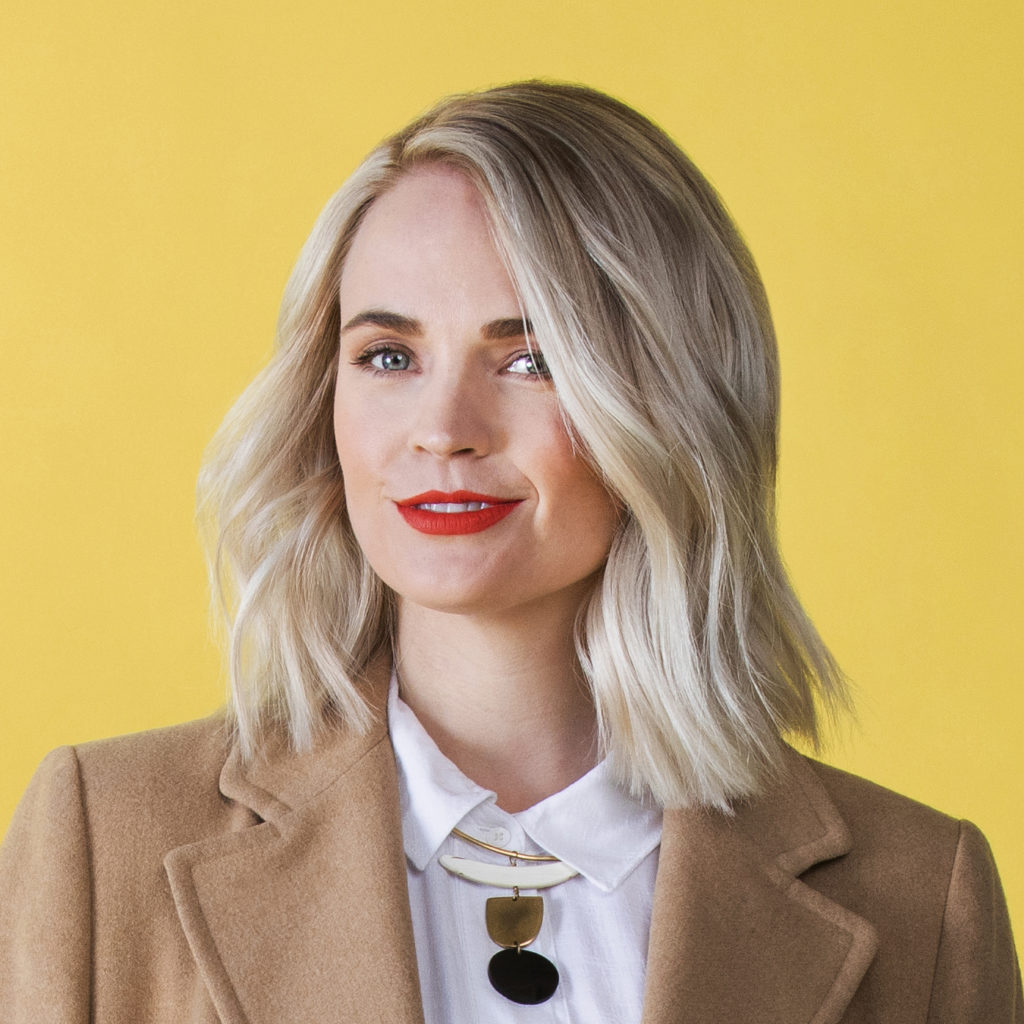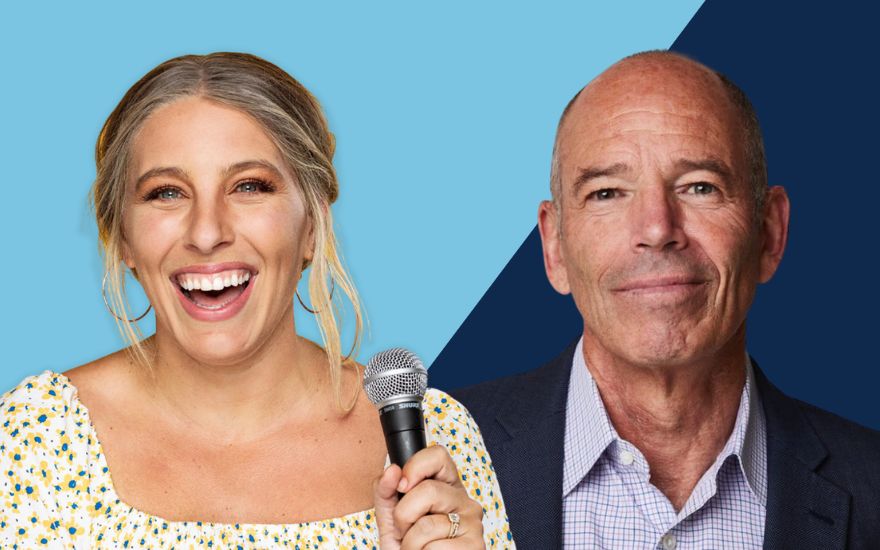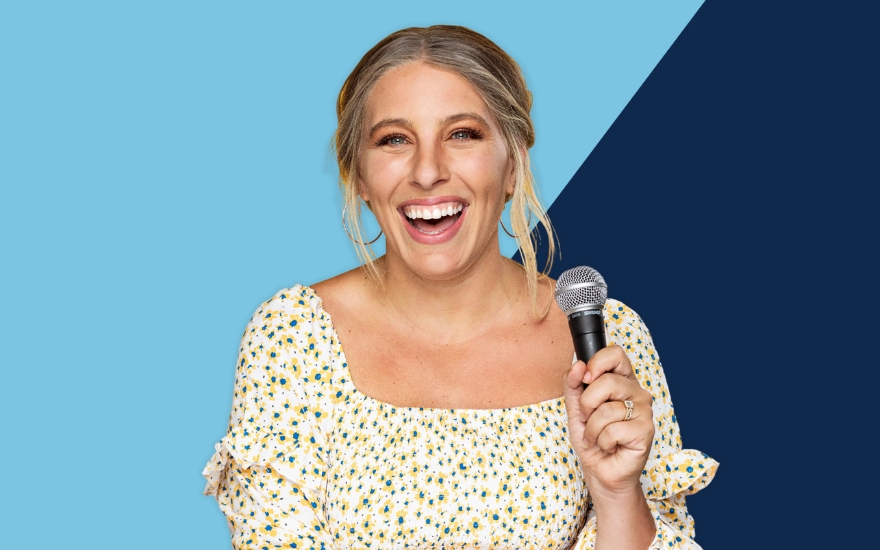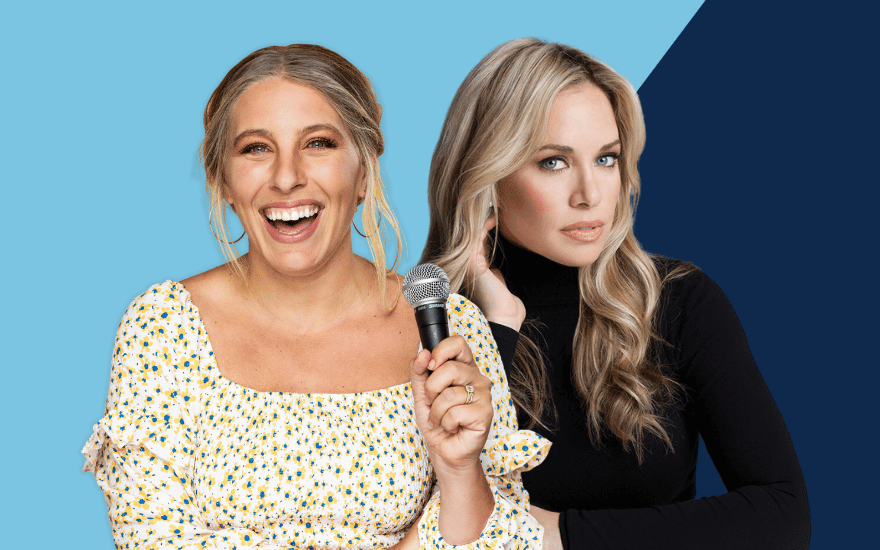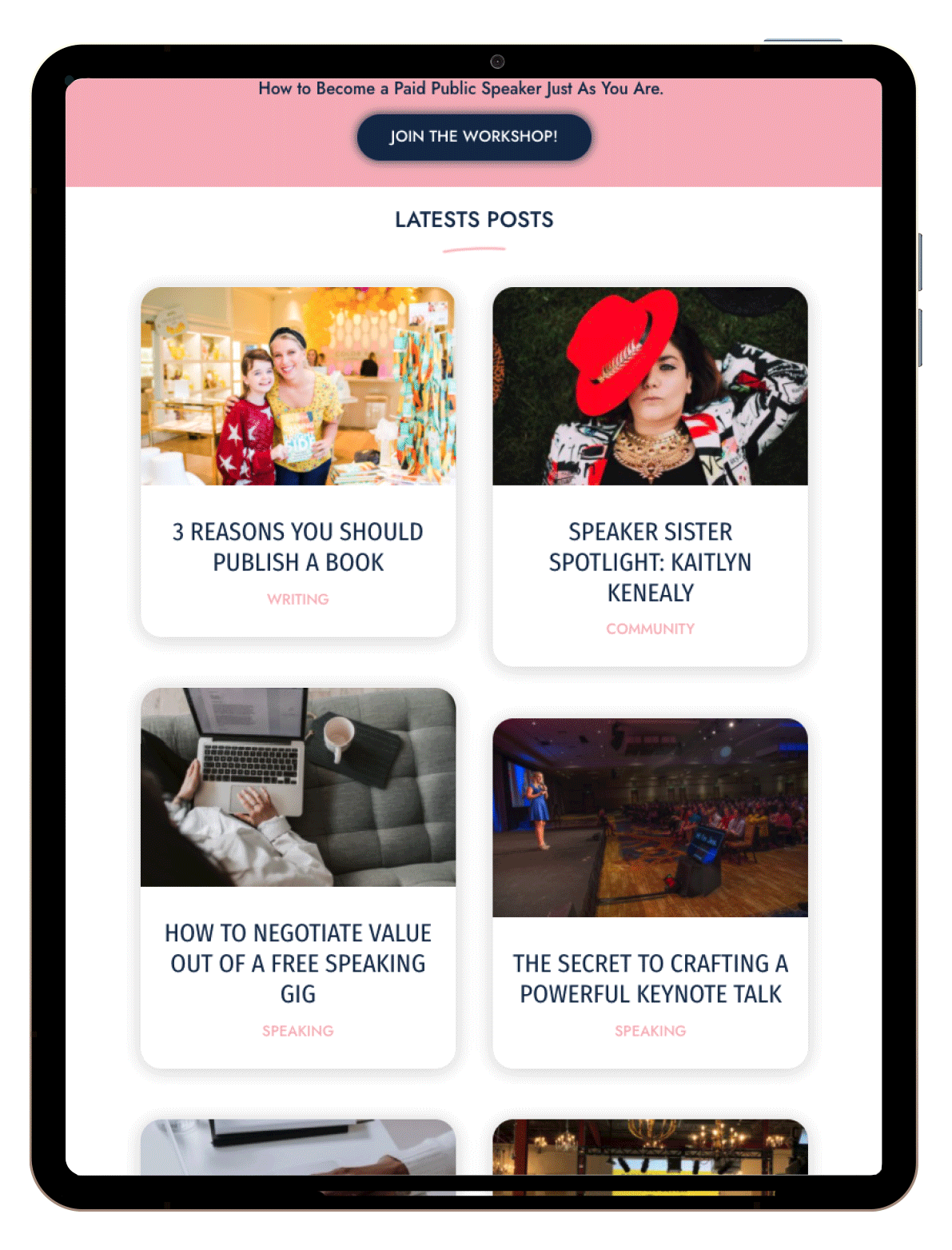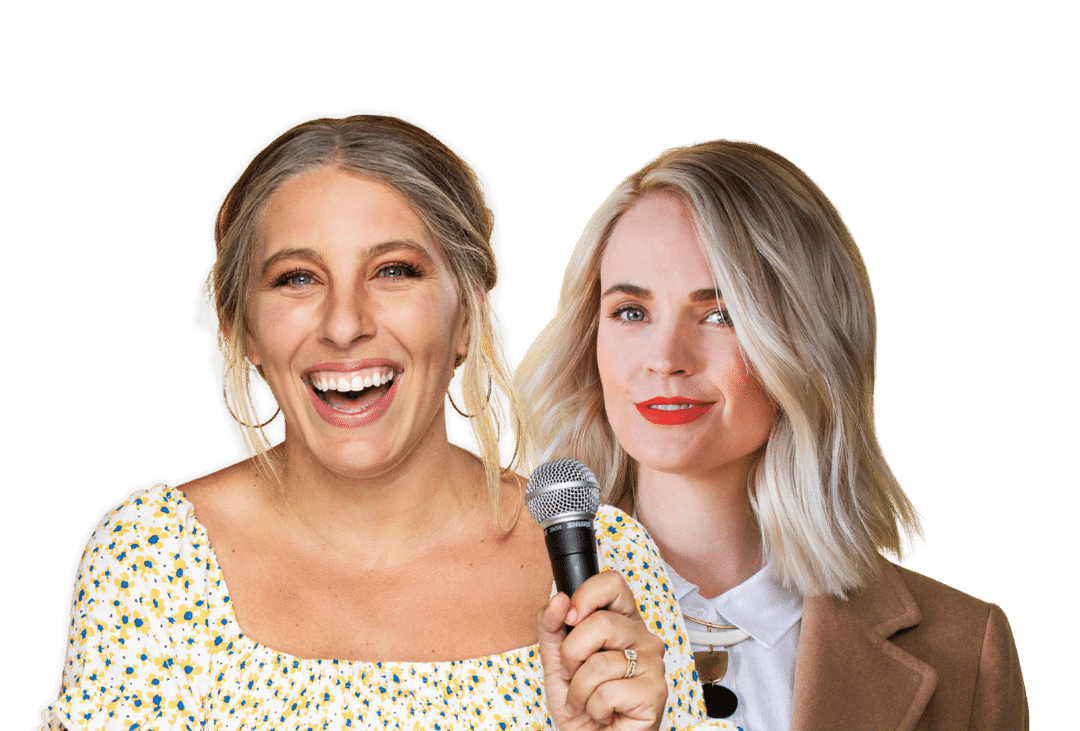


Conquer Imposter Syndrome. JK, but Here’s How to Try, with Liz Forkin Bohannon



JUMP TO
PODCAST HOME
LISTEN TO THE EPISODE
ON THIS EPISODE OF AMPLIFY
On This Episode of Amplify, Liz Forkin Bohannon talks to Jess what she calls “Beginner’s Pluck”, imposter syndrome, the power of storytelling, and the beauty of being an outsider.
FOLLOW LIZ
ABOUT OUR GUEST – Liz Forkin Bohannon
Liz Forkin Bohannon, Founder of Sseko Designs, keynote speaker, host of the Plucking Up Podcast, and author of Beginner’s Pluck.
SHOW NOTES
A beginner’s mindset can foster curiosity, creativity, and growth – and it can even help out at least a little bit with that fear we all have: Imposter Syndrome.
Today, Liz Forkin Bohannon talks to Jess what she calls “Beginner’s Pluck,, imposter syndrome, the power of storytelling, and the beauty of being an outsider.
Liz Forkin Bohannon is the Founder of Sseko Designs, keynote speaker, host of the Plucking Up Podcast, and author of Beginner’s Pluck.
(00:00) Introducing Liz Forkin Bohannon
(04:30) The awkwardness of being a beginner
(08:30) The problem with Earned Dogmatism
(12:30) Your responsibility to share your knowledge
(18:30) Liz’s evolution from business owner to speaker to thought leader
(22:30) “I can’t do math in public. Why are you bringing me to speak?”
(25:40) Beginner’s Pluck
Amplify with Jess is produced by Earfluence, and brought to you by Mic Drop Workshop.
TRANSCRIPT
Liz Forkin Bohannon – 00:00:01:
I’m not looking to go hiking with a world-class mountaineer. Like that sounds 0% fun to me. Like, no, I don’t want to feel like I’m a thousand steps behind and that I’m slowing everything down and that you’re the expert and that you’ve done this trail a million times before. I want to go hiking with somebody who’s 10% better than me. And I think about that as a communicator, as a guide, as a teacher. I’m still learning and I’m still observing, but like, let’s go together. And I think that is a way more fun way to learn.
Jess Ekstrom – 00:00:33:
Welcome to Amplify with Jess Ekstrom, a show designed to help women get out of their head and into their zone of influence. What if the truth was that you didn’t have to be an expert in order to, well, be an expert on speaking, an author, whatever it might be? In fact, sometimes it’s best if we’re not acting and pretending like we’re the experts. Liz Forkin Bohannon likes to call this a Beginner’s Pluck. How do we stay curious about what we’re talking about and what impact that we want to have? Liz knows this better than anyone. Liz is the Chief Growth Officer of Noonday Collection. She is the author of Beginner’s Pluck: Build Your Life Purpose and Impact Now . She was also named by Forbes magazine as one of the top 20 public speakers. John Maxwell named her as one of the top free transformational leaders in America. So who better to talk about Beginner’s Pluck than Liz Forkin Bohannon? Okay, you’re one of those people that. When I see any event that I am on the roster for, they’re like, oh, we had Liz the year before. And does that happen to you? Do I come up for you as much as you come up for me?
Liz – 00:01:45:
So like when they see your name, they just associate us as like, oh, you guys go together.
Jess – 00:01:52:
Yes. I think maybe it’s the blonde, although my hair got a lot darker with this pregnancy. I don’t know if that’s happened to anyone.
Liz – 00:01:57:
I know, RIP.
Jess – 00:01:59:
Yeah. Maybe it’s the blonde.
Liz – 00:02:01:
And then I heard these babies with these bright white blonde hair. I’m like, I gave you my blonde.
Jess – 00:02:06:
I know. I literally am like, my daughter has like a toe head. And all of a sudden my hair is dark and greasy now. And I’m just like, what?
Liz -00:02:14:
Not fair.
Jess – 00:02:15:
You stole everything from me. No. But, any podcast that I’m on, like I was just on Jordan Montgomery’s Growth Over Goals, like anything that they see me and they’re like, oh, Liz. And I’m like, is it the blind speaker/social empire builder that we just like fit in that same category together?
Liz – 00:02:37:
Yeah, I think it’s all of the above. I think it is all of the above. And I feel like our messages, while being very distinct, are both very energetic and positive. And so there’s definitely some crossover there. But I love it. Let’s just go – my new business partner and I, Jessica Honegger – We joke, we call each other now one another stunt doubles. And we’re like, this stunt double life is amazing. Because we used to previously have roles in our companies. Where it was like, no one else can do that. Like that’s kind of, you kind of have to show up for that. And there’s no backup plan. And now that we’re working together, oftentimes, you know, there’ll be a situation where it’s like, I can’t make it to this event or I can’t do this call. Can you take it? You know, we’re always like, yeah, absolutely. And she actually got me a little necklace that was engraved with stunt double. And so I’m just saying, living the stunt double life. I don’t want to ever do anything again without a stunt double.
Jess – 00:03:35:
That is so amazing.
Liz – 00:03:36:
I’m a big fan of the model, actually.
Jess – 00:03:38:
Oh, I love it. One of my employees at Headbands of Hope, who’s now the president, Lauren, she’s amazing. She would go to trade shows and we kind of, we look alike and people would see me on the poster or they saw me speak somewhere and they would be like, oh my gosh, you know, Jess, I loved you. And for years she corrected them. She’s like, actually, I’m not Jess anymore. And then finally she’s like, no, I’m, I’m Jess. Like just, let’s just embrace it. Yeah. She’s like, yes, I lived in an Airstream. Yes, I wrote a book, blah, blah, blah. Like, are you going to buy some headbands?
Liz – 00:04:13:
I love it. Everybody trying to be the most unique person in the world. I’m over here trying to be like-
Jess – 00:04:17:
No, I’ll have a stunt double.
Liz – 00:04:18:
It’s great. I can be interchangeable as somebody.
Jess – 00:04:21:
Well, I mean, speaking of stunt doubles, you and I walked through, I feel like we have been, I don’t know, just circling each other for years, whether that’s on the speaking circuit, whether that’s on like, you know, taking our businesses that we created and then using speaking as a way to tell the story and grow it. And also our books like Chasing the Bright Side and Beginner’s Pluck came out around similar times. So we were really there to help each other, which I love that our relationship kind of grew from that. But one of the things that I love about you and your platform and what you do is you find ways to make things that seem scary and complicated, simplified. So like, how do we bring it back to the basics of when we are beginners? And I think that can be so helpful in business, in life, but especially in speaking, that new feeling of going up on stage or even just hitting record and watching yourself. Oh, like the worst feeling ever. How do we get past that fear of like the awkwardness of being a beginner?
Liz – 00:05:27:
I love it. You know, something that’s getting a lot of airtime right now is this concept of imposter syndrome, right? This idea of when I do something for the first time or not even for the first time, at some point I’m going to mess up. I’m not going to do as well as people expected. And then I’m going to get found out that I was faking it all along. People thought I was further along than I am. And if I take this risk, I’m risking kind of being found out. It’s super fair. And I love that we’re talking about it a lot because it’s a real psychological construct that keeps a lot of us stuck. What I also want people to know is that there is another side of imposter syndrome. Like everything is on a spectrum, right? And so on the other side of the imposter syndrome spectrum is something called Earned Dogmatism. And earned dogmatism is basically when you so much don’t struggle with imposter syndrome that you start to get really set in your ways. You’ve had success. You start to associate the future success with your past success, right? This idea of like, well, I’ve done it before. I’ve done it 100 times. And I’m amazing at it. I am unconsciously competent at this thing. So that’s stage four of the learning journey. It’s the last stage, supposedly, is this stage of unconscious competence. And so if we stay in that place for too long, we get this thing called Earned Dogmatism, which actually keeps us from being curious, keeps us from being creative, and ultimately keeps us from being effective. And so one of the things, you know, we can spend so much time beating ourselves up or be like, be more confident or don’t struggle with this or believe in yourself. And none of those are bad messages. But I find myself actually a little bit more motivated by going, oh, like, what if this thing is actually working for you? Like, what if this thing that you’ve been told is this really bad thing that you need to like try to get away from is actually just kind of like keeping you in a space of curiosity, of openness, of humility, of growth mindset. And all of those things in the long run are actually so much more likely to equip us for long-term success. So what I love about kind of the whole concept of Beginner’s Pluck is really it’s exploring, hey, what are the things, what are the mentalities, the principles, the mindsets, the way of showing up in the world that beginners, true beginners actually do more naturally. And if you are a beginner and you know these things, you can actually understand how they are really your kind of magical superpowers. But you have to treat them like that. You can’t be insecure or bummed about them or your powers can’t work for you. So if you are a beginner, there are actually things that you will do that will make you more successful than if you are kind of a master or expert in your craft. If you are a master or expert in your craft, we are the ones that have to be intentionally channeling our inner beginner and putting ourselves in situations where we’re back in this stage two of the learning journey, which is conscious incompetence. Where you’re going, I haven’t done this before. This is new territory for me. And there’s a possibility of risk and failure. And by doing that, we can kind of channel our inner beginner and combat that earned dogmatism situation that we definitely want to avoid.
Jess – 00:08:39:
That is fascinating to me. And the irony, I think, especially as it comes to like speaking or writing a book, is that people feel that in order to be qualified to speak or write a book, you have to be the expert. You have to be the person that knows everything and anything about this topic. And what I talk about in Mic Drop Workshop all the time is, no, I’d say be 10% ahead. Be 10% ahead and just unwaveringly curious about that topic. But if you come onto the stage or into an arena with the mindset of, I know everything about this and let me tell you. One, you’re not going to connect with your audience. And two, you’re not going to keep furthering your research and your knowledge around this topic because you feel like you’ve peaked. And so even in our delivery as speakers, it’s almost like, how do you deliver information as if you are finding it out with them? Would you agree?
Liz – 00:09:49:
Yes, I love that. You’re speaking what you just said with such a beautiful kind of explanation of the manifestation of earned dogmatism, like what happens when we get into this place where we think we have it figured out. And you’re totally right. In the context of communicating, we think that pure confidence inspires other people to believe that we’re competent. And that’s actually not always the case. I think about it when I’m like, hey, I’ve got a free weekend. Some friends call me. And they ask me to go on a hike. Who do I want to go hiking with? I want to go hiking with somebody that’s about 10% better than me, that knows a little bit more. You know, they know a really cool trail that I’ve never been to before. They’re, you know, they brought a fun snack that’s great for the trail that I’ve never heard of before. And they can encourage me a little bit because I’m not, you know, I’ll definitely fall behind. And I want somebody who can kind of like help keep me going. I’m not looking to go hiking with a world-class mountaineer. Like that sounds 0% fun to me. Like, no, I don’t want to feel like I’m a thousand steps behind and that I’m slowing everything down and that you’re the expert and that you’ve done this trail a million times before. I want to go hiking with somebody who’s 10% better than me. And I think about that as a communicator, as a guide, as a teacher. It’s like, no, we’re on the hike together. And I might be, I have access to the map or the compass or whatever analogy that you want to use that you might not right now. And I’ve done this trail a couple of times before, but I’m still learning and I’m still observing. But like, let’s go together. And I think that is a way more fun way to learn.
Jess – 00:11:26:
I mean, it’s walking with instead of pointing towards. It’s like, how do we walk? And this comes from speaking, thought leadership, but just leadership in general. It’s like, what if we were figuring this out together? What if we were all a part of the equation? And maybe I’m a couple steps ahead, but I’m not miles ahead. And I think that that’s also, I love the hiking analogy. One like quick side story. I have been hiking with someone who is like 80% better than me. And that is my sister, who is a wilderness guide, who has like done these expeditions all over the world, Australia and everything. And I went and visited her in Yosemite. She’s like, “let’s go on a stroll”. And I’m thinking, “oh yeah, a stroll”.
Liz – 00:12:12:
Red flag.
Jess – 00:12:13:
I brought a drink. Like this is how casual I thought this was. We are like, it is the technicality of like, put your left foot here. I’m like, I was like, forget my drink. Like we’re, it was getting dark. It was, it was awful. Heather.
Liz – 00:12:30:
You’re like, but my eyes smoke a frappuccino.
Jess – 00:12:33:
Exactly.
Liz -00:12:33:
I have to put it down.
Jess – 00:12:35:
Yeah. I’m like, I, I love you, but we’re, we’re never doing this again. So that really spoke to me. But as thought leaders, the other way that I like to think about this is when you do become a few steps ahead on something, whether it’s your knowledge around being a beginner and curiosity, my knowledge about optimism, what I wrote, Chasing the Bright Side about, it’s like when you find something out. You now have a responsibility to throw the rope down. And that’s what I think thought leadership is, is not about like this all-knowing flag in the ground. I am the master of optimism or the master of curiosity. It’s like, hey, I reached this summit maybe before some other people. So now my job and role as a human is to toss the rope down. That might be being a speaker. That might be writing a book. That might be creating a course. And again, not everyone has to do this. But I do think in some way, once you earn knowledge in some area, It’s your responsibility to share it. Would you agree?
Liz – 00:13:41:
Yes, I would agree. And I’ll add, I think a place where people get tripped up, you know, I can envision a listener going, okay, well, Liz has curiosity and Jess has optimism. And what’s my thing going to be? Here’s the thing. Liz Forkin Bohannon, not the first person in the world to talk about curiosity. Jess Ekstrom, like not the first person in the world.
Jess – 00:14:02:
If we were, our life would look a lot different. Yeah, there would probably be a gold wall behind me. Like, wow, this woman invented optimism. Yeah.
Liz – 00:14:10:
So I think it’s like absolute uniqueness or even like discovery, something that nobody else has ever thought about before or applied in a really interesting. No, who do you think you are? Like there’s like five people in the world who have actually discovered unique, interesting concepts that no one else ever knew before. Probably more than that, but not very many. The point is you don’t have to be entirely unique. You don’t have to make some sort of like novel discovery. So often I find this specifically with women. There’s this thing of like, well, someone’s already doing that. Someone’s already talking about optimism. Somebody already wrote a book that had to do with curiosity, whatever it is. And going, yeah, but guess what? No one named Liz with three sons under the age of seven who started a social enterprise in East Africa and lives in a commune on Portland, Oregon and is, you know, daughter to Janie Forkin, who was a pediatric nurse who kind of taught her about blah, blah, blah, blah, blah, blah, blah.
Jess – 00:15:08:
Yes.
Liz – 00:15:08:
No one, that person isn’t out there talking about what I’m talking about. So just understanding that the way you embody whatever it is that you are talking about, that you are an expert in, that has changed your life for the better intrinsically is making your story really unique in the way in which you share it. And we have a responsibility, I totally agree, Jess, of understanding that folks might connect. Like somebody could have heard my concepts, probably not in the exact same way that I would say them, but, you know, maybe something similar. And it was delivered from a different person that has a different lived experience that even has maybe like a different tone or way of showing up in the world that for whatever reason, it didn’t impact them. And then I can walk into the room and maybe for whatever reason, maybe, I don’t know, we have some sort of similar life situation or maybe it’s my sense of humor. There might just be something about me that allows me to kind of tap into and unlock something that that person hasn’t unlocked before. And just also leaning into kind of the mystery and beauty of that, I think is really compelling to me. Vice versa, there might be folks that just don’t connect with me and don’t resonate with me. And then just, you might walk along and say the same thing. And all of a sudden they’re like, wow, that just totally unlocked something for me. And I think that’s beautiful and it’s mysterious. And I love that it kind of takes the focus off of you know, the outcome and trying to control the outcome and instead being like, are you faithful? Are you being faithful with the story you’re living and with the gifts of knowledge and understanding that you’ve gleaned along the way? And if so, great. Go out there, do it the best that you can, but know that there’s also going to be some kind of alchemy and mystery in who receives what when. And then we get to be a part of that. And I think that’s really beautiful.
Jess – 00:16:56:
Your story contextualizes familiar concepts. Like the things that we need to hear today, the things that CEOs and these, you know, people need to hear are the same things that we learned in kindergarten. Like, confidence, optimism, curiosity. These are things that we learned when we were sitting crisscross applesauce in kindergarten. But the story and the personal narratives and the anecdotes of how we learned those things are what makes familiar concepts new. And the other reality is it’s like, people don’t want to have to think that hard. And we need to be reminded of things that we already know, but in new ways. And so one of my biggest things that I think about that makes me so sad is all of the books, ideas, or speakers that are like, unpublished and unspoken because they think that, whatever they do has to break the internet and revolutionize the world. And if that’s the standard that we hold ourselves to, or that like everything we say has to go viral or everything that is printed or published has to change the way that we do something. And when we set the bar so high that we have to like come up with a new law of gravity, then we’ll never start. And I think that’s where Beginner’s Pluck and this idea of curiosity is so perfect when it comes to chasing our ambitions as speakers and authors and thought leaders is starting from a place of curiosity. So for your speaking career, first you started with Sseko Designs. Was speaking a way to grow the business? Like what, how, what was the evolution from business owner to speaker thought leader?
Liz – 00:18:55:
Yeah. A hundred percent. For a long, long, long time, I saw speaking as a way not to just not have to pay for advertising and marketing, but eventually how to get paid for advertising and marketing. But my kind of yes for many, many, many years, like would I go to an event was really around who’s the target audience and does that target audience of this event that I’m going to be speaking to align with the target demographic for my company? And is this a good opportunity to share about the company? So yes, which was a mate, like, you know, I probably got my first speaking invite a year or two into running Sseko. And I just remember being like, this is awesome. Like I’m going to have rapt attention of all of these people to share about my company. Great. Now what I realized quickly is that while from a business perspective, it’s awesome. Like take the stage, you know, share the story, build brand evangelists. That’s great. You actually will not be a very valuable speaker if what you’re trying to do is just share the story of your company because every great speaker and storyteller and communicator, actually, they’re not just sharing their story. They have done the work of inspecting their own story and going, okay, here’s the specifics of how this all worked out for me. What are the universal principles that I can pull out of this story that’s going to help you, that’s going to inspire you, that you’re going to be able to go, I get, and I can see how that connects in my own life, even though I didn’t move to Uganda when I was 22, you know, to be a journalist and come home with a shoe company. And so sometimes I love, you know, as my speaking career has grown, the invitations, sometimes I get invites and I know why they invited me. You know, like I’m just showing up in a space, whether it’s like more of a leadership capacity or maybe it’s, you know, a group of social entrepreneurs. And I’m like, okay, I totally get why I’m here. I don’t know about you, but sometimes I get invitations and I’m like, it’s in an industry that I know nothing about. It is a demographic that is so far from kind of the key demographic that I’ve ever worked with that it’s kind of easy for me to be like, why did you invite me to come here? But I actually have grown to really love those events and those audiences because it challenges me to go like, are the truths that you’ve mined from your story powerful enough and universal enough that they are going to impact somebody who is in a different industry, who’s in a different stage of life, who isn’t in kind of your core demographic, who maybe can’t relate with that you’re this age and you have this many kids, whatever it is. You run this type of business. And that to me is the marker of a really great speaker and communicator and storyteller is actually you’re not just serving up your story. You’re not saying, here’s what I did. You’re saying, here’s what I learned along the way and here’s how those things, yes. But the story is just the narrative. It’s like the Trojan horse. You put the principles in the story because our brains are wired to receive and to recall stories so much more than just facts delivered on a platter. So you put the truths inside the story and you deliver that. But if the truths are high quality enough, the specifics of the story actually don’t matter. I think it probably took me a while to figure that out that it’s like, oh, I could probably keep getting invited to share my story, but I don’t think I’m delivering as much value to the audience as I could be. Honestly, probably when my speaking career started to take off is the moment where I said, what if I stopped thinking about this as me promoting my company? I started thinking about this as I have the opportunity to show up and serve people in this room. And how can I do that the best? And that’s actually probably when I became a “real speaker”.
Jess – 00:22:45:
I’m your stunt double. Same story. Like, I was hitching the business not proposing the value of the story and going to like taking out the universal experience that other people can learn from. I have spoken at, I’m sure you have like, and actually I’m curious to hear like what your most outrageous industry is that you’ve spoken at. I’ve spoken at three different equestrian conferences. Mark my word, Liz, you will not find me on a horse for the rest of my days. I have an insane fear of horses. Oh my gosh. Like my husband took us on this horseback riding trip for like our anniversary and you just see me sobbing on this horse. But yet I’ve spoken at three different equestrian conferences and that just goes to show the effort and time that I’ve put in as a speaker to be like, it does not matter if I can do the thing that you do. There is something that we can learn from all of our stories.
Liz – 00:23:52:
And you know, sometimes having that third-party perspective, like somebody that comes from out of left field can actually be really valuable because we’re not, you know, everybody, we all get kind of indoctrinated into our own ways of thinking and our specific industry, our voices that we’re all listening to. And so sometimes truly being like a fresh third-party outsider can help you deliver even more value because you’re bringing a different perspective that hasn’t been like, okay, we know we’ve heard this. We’ve all accepted it as gospel. And sometimes you probably, I love being an outsider and accidentally questioning things, like calling into question things that everybody in that specific room has come to believe is gospel truth. And then all of a sudden I’m like, oh, I didn’t know that was a precious cow that we couldn’t, you know, like that we couldn’t talk about or that we think about in a different way. And I think that’s a real value actually sometimes to coming pretty far out of left field.
Jess – 00:24:43:
I spoke at this like data analyst conference and I’m like, I can’t do math in public. I don’t do any numbers. And I was like, why are you bringing me to speak? And this was very new to the realization that like, oh, my speech is not my audience or my story is not my audience. It’s a different thing. And they were like, we need to remind the data analysts in the audience of the people that the numbers represent. And I was like, oh, and that was really my light bulb moment was this can be a vehicle for people who have no interest in starting a business, but they can learn something from my story.
Liz – 00:25:27:
That’s good.
Jess – 00:25:28:
So as we wrap, what is one tidbit piece of advice for someone maybe in their Beginner’s Pluck season, whether it’s speaking or something else that they’re trying to do or create, and maybe feeling that imposter syndrome start to creep in?
Liz – 00:25:46:
You know, one of my favorite principles of Beginner’s Pluck is this idea of giving yourself permission to dream small and then to actually take your small dream seriously. And just what you said about just how sad you are about like thinking about the graveyard of books, of speeches, of blog posts, of content, of ideas that never make it out into the universe because the person that was given the gift of stewarding that didn’t think it was big enough, didn’t think it was revolutionary enough, didn’t think it was going to break the internet. So instead they said, I’ll just – I’m going to – I’ll kill it before it sees the light of day. And I think really beautiful things start to happen when we stop running all of our ideas and all of our dreams and all of our desires and all of our offerings by this, you know, I don’t know, 12-point matrix question that we’re asking of. Is it big enough? Is it good enough? Is it revolutionary enough? Is it fancy looking enough? Is it this? Is it going to be successful right away enough? And instead just say like, what if it was okay? Like, what if it is small? What if it is small? But what if you give that small dream or idea the energy that you would typically reserve for like a big dream. Like what if you take it seriously? What if you set goals around it? What if you give it energy? What if you tell your friends about it? What if you invite people to come? Because it’s small, but it’s actually big. In your world, if you treated it with big energy, I think we can really unlock a lot of beauty. And I also believe it starts to put us in a position where we’re not the center of the story anymore. And that’s actually a really beautiful place to be in. I think a lot of folks, specifically women think, I’m going to say something that’s going to sound kind of harsh. So stay with me.
Jess – 00:27:37:
Bring it.
Liz – 00:27:38:
Okay. I’m doing it out of love. I think a lot of women are like, I just really struggle with insecurity. I just don’t, you know, I struggle with insecurity. I don’t think I’m good enough and that’s what’s keeping me from taking the stage or from writing the book or from, you know, launching the thing. I’m going to pause it. That I actually don’t think it’s your insecurity. I think it is an overinflated sense of ego because who are you to say, like who are you to say that in order for it to be worth your time, it has to hit Oprah level status or, you know, let go viral. Also, who do you think is sitting around watching your every move, evaluating your success or not, you know, right? Like you are giving so much power to other people’s opinions, but yet that’s also assuming you have a lot of eyeballs on you. There are so many people that are sitting around and they’re watching and they’re waiting and they’re going to go see what your next move is. And what I want to say is like, bless you. No, we’re all just like kind of surviving and figuring out how we’re going to get our kids after school when the board meeting ran late and figuring out what’s for dinner and why our Q4 results are, you know, not where we need them to be. Like no one is sitting around waiting for you to succeed or fail. You’re just not that big of a deal. And I say that in the most loving way of going, I actually believe that when we realize we are just one tiny part of a big, beautiful 8 billion person body that a hundred years from now, like very few remnants of our entire civilization. Okay, maybe that’s a little bit dramatic. I’m sure there will be remnants from our civilization in 100 years. But the point is, I actually think that there is something really freeing and empowering about recognizing your smallness and going, so man, if this thing brings you to life and you think it could serve other people, just go do it and do it with all of your heart and give that, even if it is kind of small dream. Big, big energy and commitment.
Jess – 00:29:47:
Oh my gosh. I mean, the realization that no one is thinking about you as much as you think that they are can either be a crushing disappointment or the most freeing discovery. And you, my friend, have taught everyone listening to recognize that realization as the most freeing discovery. So Liz, thank you so much. I would love to be both you and Jessica’s stunt double whenever you need me.
Liz – 00:30:15:
Yes. You know what? Who says we don’t need a third stunt double? I love it.
Jess – 00:30:20:
I need to get some highlights first, but where can we find you? And definitely everyone listening, get Beginner’s Pluck. Seriously, one of my favorite reads.
Liz – 00:30:29:
Yeah. So my book is Beginner’s Pluck. I have a podcast called Plucking Up where I get to interview successful people, but only on the condition that they’ll tell us about their failures and their rejections and their pluck ups along the way. I also mainly I’m on Instagram. I’m @LizBohannon and I love to hear from folks. So feel free to hit me up there. And then my businesses are Noonday Collection is the fair trade, socially conscious business that we are building community and connection and impact all over the globe. And I’d love for you to check that out as well.
Jess – 00:31:02:
I have loved seeing that. That’s like a whole other podcast of that whole origin and evolution of that. But Liz, thank you so much. Honored to call you a friend and we’ll talk to you soon.
Liz – 00:31:11:
Thanks, Jess. Bye-bye.
Jess – 00:31:16:
Thanks for listening to Amplify. If you are a fan of the show, show us some podcast love by giving us a rating and review. And give us a follow @MicDropWorkshop and @JessEkstrom. This episode was edited and produced by Earfluence and I’m Jess Ekstrom, your host. Remember that you deserve the biggest stage. So let’s find out how to get you there. I’ll see you again soon.
MORE FROM THE AMPLIFY PODCAST
Netflix Co-founder Marc Randolph on Testing New Material On Stage
JUMP TOPODCAST HOMELISTEN TO THE EPISODEON THIS EPISODE OF AMPLIFYAs co-founder and first CEO of Netflix, Marc Randolph led the company from its inception in 1998 through its IPO in 2002. He left the company a year later to pursue other passions, which includes public...
More Doors Open When You Take the Opportunity
JUMP TOPODCAST HOMELISTEN TO THE EPISODEON THIS EPISODE OF AMPLIFYWhen Jess was in college, she applied for an internship with NBC’s Today Show…and got it. In the back of her mind though, she was pretty sure she only got the job for a nefarious reason. But did that...
Creating Confidence On Stage, with Heather Monahan
JUMP TOPODCAST HOMELISTEN TO THE EPISODEON THIS EPISODE OF AMPLIFYToday we explore what many of us struggle with - the power of confidence and self-belief. The trick is that confidence is a muscle we can work on every day, and we can create a strong foundation from...

Mic Drop Workshop® helps women tell and sell their story as paid public speakers
Subscribe to our weekly newsletter!
Receive direct access to upcoming events and event planners who are looking for public speakers, keynote speakers, motivational speakers, event industry trends, and our favorite speaker products & services.
© Copyright 2024 Jess Ekstrom. All Rights Reserved | Terms & Conditions | Privacy Policy | FAQ | Contact
Website & Branding Design by Orange Moss Creative




